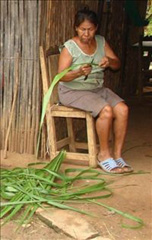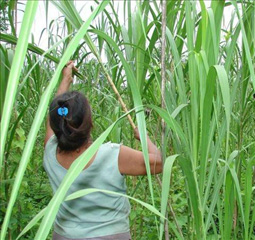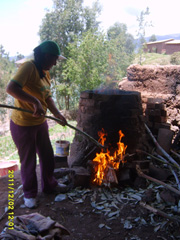OWP
Spiral Cana Flecha Bracelet
Spiral Cana Flecha Bracelet
Couldn't load pickup availability
Share
Caña Flecha is a sugar cane like plant that can only be found along the coastal regions of Colombia, South America. The Zenu Tribe cultivates the thin stalk-like leaves using processes and techniques that date back to the 1500's and weaves them into various geometric patterns creating these unique bracelets.
Artisans at the fair trade organization Joyeria Semilla are known for creating jewelry from materials readily available in their environment including seeds, natural fibers and leaves. Joyeria Semilla’s objectives are to create new jobs, to revive Colombia's traditional handicrafts and to better manage their natural resources.
- Closed measures 1-1/4” with variable diameter
Handmade in Colombia and fair trade imported.
 Joyeria Semilla meaning Seed Jewelry is a small fair-trade workshop in the Andean town of Villa de Leyva, Colombia. Girasol Taborda, a local artisan and social entrepreneur, started the workshop in the mid-1990s.
Joyeria Semilla meaning Seed Jewelry is a small fair-trade workshop in the Andean town of Villa de Leyva, Colombia. Girasol Taborda, a local artisan and social entrepreneur, started the workshop in the mid-1990s.
Joyeria Semilla’s objective is three-folds; to create new jobs, revive Colombia's handicrafts sector and to motivate locals to better manage their natural resources. The organization works primarily with socially and economically disadvantaged youths, single mothers and people with disabilities in the area. The company offers free training in product design, technical training and marketing to new members. Joyeria Semilla has trained them in the craft of jewelry-making.

Caña Flecha or “Gynerium Sagittatum” is a locally found palm tree in the regions of the Caribbean coast. The leaves from this plant are used for making jewelry, woven hats, bags and baskets. The Zenú Indians were and their descendants inherited the tradition of picking veins of the green palm leaf for weaving. These veins were made into woven hats and other products for their personal use.
The Zenú culture is said to have existed between 200BC to1600AD. With the arrival of the colonizers in the 16th century, the indigenous community declined of unknown reasons. Today a very small population remains that claims the inheritance of the almost extinct Zenú tribe. Known for their skills in the construction of major waterworks, canals and irrigation system along with being skilled goldsmiths, examples of their accomplished craftsmanship are found in various museums around the world. Their larger means of subsistence were hunting, farming, fishing and trading.
Caña Flecha is found in abundance in the region, and hence makes for a sustainable and naturally available raw material for these products. Every bit of the plant is utilized – from using in building walls and roofs in houses to food for cattle and medicinal purposes. It is from the central vein of the leaf that the fibers for weaving are obtained. After the hard surface is peeled off, the fibers are left in the sun to dry and undergo a natural tinting process; these fibers are barely about 1 millimeter in thickness and hence call for a lot of skill and patience to weave with. The dried fibers are then processed for natural coloration - some are boiled with lemon to whiten them and some are treated with mud and boiled with plantain leaves to blacken them. The designs are based on ancient motifs and mathematical representations, which are inspired by the early Zenú culture.
About the Artisans
About the Artisans
Ceramica Quinua, an artisan cooperative known for its social and environmental responsibility, offers steady work to six workshops and 36 families in Ayachucho, Peru. Ceramica Quinua is dedicated to decreasing the use of firewood to reduce deforestation, and as such, works primarily with clay, which is extracted from the land in a controlled manner to avoid erosion.
The artisans shape and fire their pieces in home-based workshops during their nine-hour workday. Children often sit in on the workshops during their free time in so they may learn the trade that's been passed from ancestor to ancestor. The organization also takes pride in offering health care for its craftsmen, and for sharing its environmental knowledge and conservation techniques with students at public schools.
The Quinua district is characterized by the eucalyptus and alder-scented atmosphere of its mountain and forest landscapes. The name Quinua is derived from the Qenwal plant, said to be comparable in beauty only to the Quinuin women. The unique flora and fauna that inhabit the territory are fast becoming a major tourist attraction. Unfortunately, deforestation and pollution from paint chemicals are threatening their existence.

Materials
Materials
Dimensions
Dimensions
Care information
Care information





Subscribe to our emails
Subscribe to our mailing list for insider news, product launches, and more.





